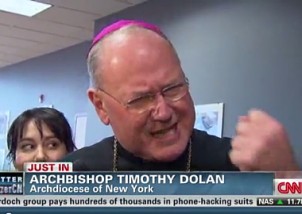Contraception Furor V. Catholic Realities
By Mary E. Hunt
Anyone who thinks that the much-discussed compromise offered by the Obama administration will end the US Catholic Bishops’ efforts to eradicate contraception and otherwise truncate women’s rights is sadly mistaken. Their show of ecclesial muscle, noticed big time by the White House in an election year, only serves to reinforce and reinscribe a moral authority that many Catholics no longer grant to the hierarchy. We understand ourselves in far more mature, differentiated, and autonomous fashions that vary widely among us. We vote accordingly. The furor over the provision of contraceptive services focuses attention on the Catholic community, a quarter of the US population. Generalizations are hazardous, and the obvious is not usually what it appears to be. There are not two teams (the bishops and the rest of us), nor are there just conservatives and progressives. As that quarter of the population, we range from Opus Dei to Catholics for Choice, from parish members to base community adherents, from students to seniors, and everyone in the middle. We do not speak in one voice, and no one speaks for all of us. We each have one vote. Not even the seemingly middle-of-the-road folks, like some media members and lobbyists who claim to be the voice of Catholic reason, represent anyone but themselves. This is the contemporary Catholic situation, and anyone who tries to persuade otherwise has a bridge to sell in Brooklyn. Nonetheless, the current flap over health care reveals three Catholic realities: it is about birth control, it is not about religious liberty, and it is not over. Why Would Anyone in 2012 Resist Birth Control? Efforts to say that the controversy is not about birth control are fruitless and foolish. No one is arguing about flu shots. This is about women’s reproductive health, something the Roman Catholic Church has tried to manage for millennia. The demand for widespread religious exemptions from a common sense policy that makes coverage of contraception part of a national health care package causes most people to scratch their heads. Why in 2012 would anyone resist birth control? Why would a church that opposes abortion not want people to use effective, economical ways of preventing unwanted pregnancies? Even the insurance companies, not known for taking the moral high ground, can spot a cost-saver when it is presented to them. Humane Vitae, the so-called birth control encyclical promulgated by Pope Paul VI in 1968, was taken out of mothballs for the occasion. Most young Catholics consider birth control a settled matter: they use it in good conscience. What they don’t know is that the decision to ban what was then called “artificial” contraception was made over and against the majority report of the Pope’s own commission. That group saw birth control pills as logical, better—a technological extension of responsible efforts to plan families. That the Pope went with a minority report in issuing the teaching against contraception shows how easily history could have gone the other way. More recent pitched battles over abortion, as well as present and future ones over same-sex love and marriage, are similarly configured; good Catholics are all over the ethical map. Efforts by the hierarchical institution to spin the current controversy as a matter of religious liberty are unconvincing. After all, it is not the Catholic Church whose liberty is impinged upon. Members, even bishops, can still teach and believe what they wish. No one forces them to use contraception. Rather, it is employees of Catholic institutions, including janitors and housekeepers, whose rights to make their own decisions about health care are impinged upon. Blaming the victim is an old trick, but, in this case, few people are buying it. Not Religious Liberty, but Religious Influence Religious liberty language is attractive, especially in an election year. But when it works the opposite way from what the bishops intended, they would do well to back off. If there are legal issues at stake, they are more along the lines of labor laws than Constitutional issues. The bishops’ issue is not religious liberty, but religious influence, namely, their own which is on the wane. The institutional Roman Catholic Church squandered the political clout it once enjoyed. Clergy sexual abuse cases and their cover-up by bishops are unspeakable crimes that cost more than just the billions of dollars spent to adjudicate cases and compensate victims. They cost credibility. The result is that the institutional Church increasingly relies on very personal issues, like contraception, to feather its nest having relinquished any claim on the death penalty, wars, the economy, and the environment where its moral weight could be so helpful. No one cares what it teaches. This is lamentable, but it opens up space for many Catholic points of view to emerge in the polls. And emerge they have, and emerge they should. The bishops remain dissatisfied with the Obama compromise and vow to fight on. Most Catholics are just glad that most women will have access to contraception, provided that the insurance companies step up to the plate. But the question that is far from settled in a democracy is how one huge religious group gets its many voices heard. Catholic voters will have a chance to express their commitment to women at the ballot box.
|
.
Any original material on these pages is copyright © BishopAccountability.org 2004. Reproduce freely with attribution.
